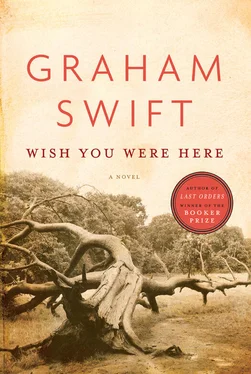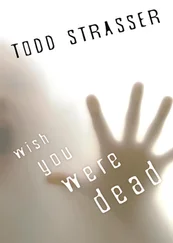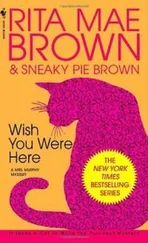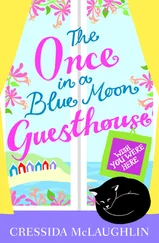Yet, just for a moment, as they’d sat there with their tea, he’d let himself slide into the opposite picture, and almost believe it. That this was their place now. Here they were at last, where they should be. He’d felt that, even as he’d felt the other thing: that they were like two ransacking burglars who’d burst into a place that wasn’t theirs at all.
‘Still sleeping in your little cubby-hole, Jack? But you’ve got the run now. This is the master bedroom.’
He’d never used that expression. He vaguely knew it was an expression used by estate agents. It was the Big Bedroom. For years now Dad had slept in this bedroom, in this same big bed, all alone, till one night he couldn’t bear to any longer.
And he had still been sleeping in his own little cubby-hole. Ellie saw everything.
‘Well,’ she’d said, a little later, ‘at least you can’t say we never gave it a whirl.’
She’d sat up with her back against the bedhead, not minding that her tits were on display. He’d pulled himself up against the bedhead too. Like a shameless king and queen, yes, surveying their realm. Through the window before them, across the drop of the land, you could see the far side of the valley, the line of the hills. A blue sky, a puff or two of cloud, the speck of a buzzard wheeling. In between was the green, stirring crown of the oak tree.
‘Now,’ Ellie had said, ‘you stay here and I’ll go and make us a pot of tea.’
And she’d gone down, in her bare arse, to the kitchen, Ellie Merrick, in her bare arse in the Jebb kitchen, in Jebb Farmhouse. And he’d thought, it wasn’t a bad arse (nor all the rest), if it wasn’t the baby arse he’d first clapped hands on fifteen years or more ago. How long had he known Ellie? Long enough to have forgotten how long. Long enough for it to have been at times an on-and-off thing. Long enough to have watched her change and change back again, to come in and out of her best. He must have done the same himself, even if he’d never noticed. Always feeling anyway like the same old lump.
He couldn’t say, by any stretch, that he was a connoisseur of women, but he was a connoisseur of Ellie. And, judging by Ellie, it was strange the way time could work on women, and not always against them. There was no saying when suddenly they might hit peak condition.
She’d gone down and come back with a tray with the tea on it. But on the tray too, of course, though he hadn’t noticed when she’d put it down on the floor on her side of the bed, must have been that letter, taken from her bag in the kitchen.
‘Caravans, Jacko.’
He couldn’t help seeing — as she let that word hang for a while and took a long sip of tea — Tom, aged six, hopping ahead of him down that path. Or seeing the wiggly letters by the door, with its two steps up: ‘Marilyn’. Or smelling salt between his fingers. Or smelling the smell all over that field, in the morning, of frying bacon. And when just a little later he was looking, himself, at that letter, he couldn’t help seeing that little yellow tabletop and that first postcard, with its blue sea and white band of cliffs, that he’d written to Ellie.
So just when he’d been thinking that this was his bed now and Ellie belonged in it, he was suddenly also thinking he was really all hers now, he belonged to her. She knew the places in him, she had him.
He’d said, as if at least he must put up some token opposition, ‘But no one takes their holidays in a caravan any more.’
But apparently they did. Or they did at the Lookout, formerly known as the Sands. The caravans weren’t like the ones Jack remembered from Brigwell Bay (and how much had that farmer charged for a week?). Nor were the caravanners. They were all sorts. With thirty-two units, when they were all on the go, you got all sorts. There were die-hard old couples who’d been coming for years and weren’t so sure about that change of name, but liked the fact that the place had ‘stayed in the family’ (how sad, about Alice and Tony). They seemed to know more about Ellie’s mum than Ellie did — or even wanted to. There were big burly families, all tattoos and noise, who in the course of a week became gentler, sweeter. There were two- or three-unit gangs of young people with windsurfing gear who, when they weren’t wearing wetsuits, wore hardly anything most of the time and liked to party all night.
All this had fascinated Jack. It had brought something out in him. You never knew what might be going on in any one of those units at any given time. It was certainly a form of livestock. You never knew what might be arriving next. Caravans. It would make him think, sometimes, of a circus, and it could sometimes be like a circus. Entertaining, raucous, a touch of danger. You had to be a bit of a policeman sometimes. You had to be their smiling host in a joke of a shirt, but there were times when you had to show them who was in charge. Jack had found he was surprisingly good at this. At both things: the smiling and the policing. Perhaps his big, lumbering weight was on his side. Or maybe it was that he’d just sometimes let slip, with his straight, blank, unreadable face, that if there was any real trouble, he kept a shotgun handy, up in the cottage, having been a farmer once, and he knew how to use it.
As for the caravanners, the Lookouters, they generally took the view that Ellie and Jack were okay. They ran a good site, they looked after you. It was all right for some, of course — sitting up there all summer long, then winging off to the Caribbean. But, at the same time, there was something a bit misfit and oddball about the two of them. There didn’t seem to be any little Luxtons, you couldn’t even be sure if they were really married. Something just a bit hillbilly. But that was okay, that was fine. There was something just a bit wacky and hillbilly about taking a holiday in a caravan anyway. And when you were on holiday you wanted colour, you didn’t want dull and ordinary. You didn’t get it, either, with those shirts of his.
Farmer Jack. It’s well over ten years now since they sat up with their tea in that bed at Jebb and Ellie uttered that word. And he’d never said then, if there had to be some token, or more than token, opposition: ‘There’s Tom, Ellie. There’s Tom.’
A steep learning curve (Ellie’s expression) at the beginning. But the main thing was, it paid. Thirty-two units. He was still good at sums, in a farmer’s way. At Jebb it hadn’t been the arithmetic but the numbers themselves that were wrong. Compared to anything they’d known before, they were in thick clover now. What with the capital from the sale of two farms, even at knock-down prices, even with debts to pay off.
Ten years. And something more than a learning curve. A release, a relaxation curve, a lightening up. He saw it in the way she smiled at him and he saw, from her smile, that, even with his great brick of a face, he must be smiling too.
But he can see it, now: the steep drop away from the farmhouse, the full-summer crown of the oak tree. The hills beyond. The exact lines of hedgerows and of tracks running between the gates in them. White dots of sheep, brown and black-and-white dots of cattle. For a moment, though for over ten years now Jack has breathed sea air, which some people find so desirable, he can even smell the land, the breath of the land. The thick, sweaty smell of a hayfield. The dry, baked smell of cooling stubble on an August evening. Smells he never smelt at the time. The smell of cow dung mingling with earth, the cheapest, lowliest of smells, but the best. Who wouldn’t wish for that as their birthright and their last living breath?
THEY’D GOT the letter nine days ago, though, strictly speaking, there was no ‘they’ about it, the operative phrase being ‘next of kin’. Tom must either have put down his brother’s name from the very beginning, or made the substitution when necessary.
Читать дальше








![Питер Джеймс - Wish You Were Dead [story]](/books/430350/piter-dzhejms-wish-you-were-dead-story-thumb.webp)



